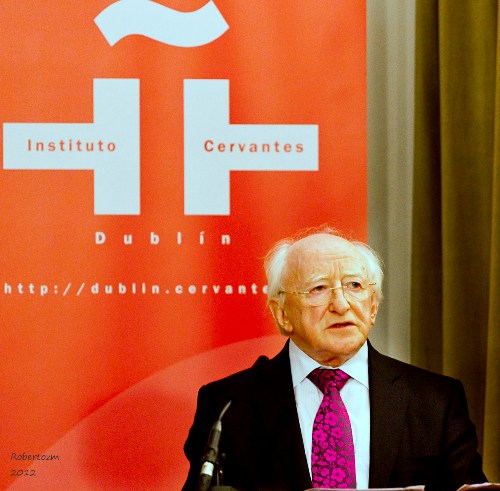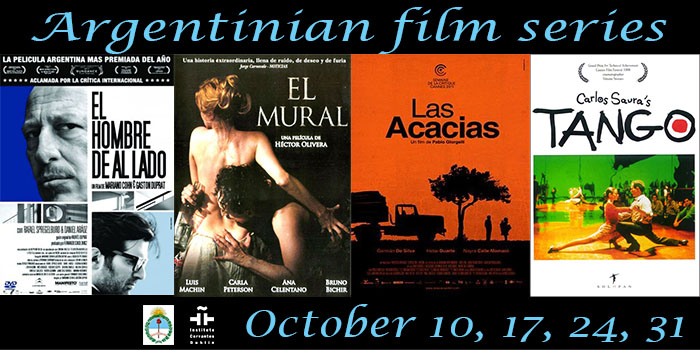Blog del Instituto Cervantes de Dublín
Torre Martello
Ciclo de cine con José Luis Garci / José Luis Garci film series
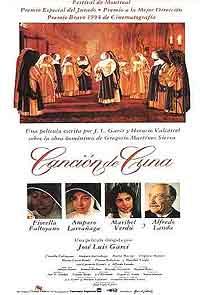 José Luis Garci (Madrid, 1944), dará comienzo con su presencia al ciclo de cine sobre su obra que organiza a partir de mañana el Instituto Cervantes de Dublín. Durante la primera sesión, se proyectará la película Canción de cuna , a partir de las 6 de la tarde en nuestro Café Literario.
José Luis Garci (Madrid, 1944), dará comienzo con su presencia al ciclo de cine sobre su obra que organiza a partir de mañana el Instituto Cervantes de Dublín. Durante la primera sesión, se proyectará la película Canción de cuna , a partir de las 6 de la tarde en nuestro Café Literario.
La acción de Canción de cuna transcurre a finales del siglo XIX, cuando un grupo de monjas encuentra abandonado a un bebé en las puertas de su convento. Este hecho romperá con la rutina de la institución en la que destaca la relación existente entre el doctor del pueblo (Alfredo Landa) y la madre priora. Adoptada por las monjas, Teresa (Maribél Verdú) crecerá como una más de ellas, pero un día aparece Pablo dispuesto a casarse con Teresa…
Instituto Cervantes brings a film series of José Luis Garci (Madrid, 1944), presented by the director, who will join us in this first session. The film Lullaby will be screened today at 6pm at Café Literario.
n the late 19th century a group of nuns finds an abandoned baby girl at the doorstep of their convent. This fact breaks with the routine of the convent which is distinguished by the relationship between the village doctor (Alfredo Landa) and the prioress. Adopted by the nuns, Teresa (Maribél Verdú) will grow as one of them; but one day sees the arrival of Pablo who wants to marry Teresa…
Lo fantástico: Homenaje a Bram Stoker | The Fantastic: Hommage to Bram Stoker
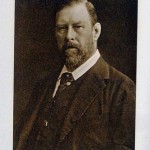 El miércoles día 28 de noviembre estarán con nosotros Luis Alberto de Cuenca y Alicia Mariño, El motivo de su visita: Bram Stoker. Porque este año se conmemora el centenario de la muerte del escritor (y matemático) dublinés. Aunque su obra fue muy prolífica, se le recuerda especiamente por la creación de una de las novelas de terror que más han influido y perdurado en la historia de la literatura: Drácula.
El miércoles día 28 de noviembre estarán con nosotros Luis Alberto de Cuenca y Alicia Mariño, El motivo de su visita: Bram Stoker. Porque este año se conmemora el centenario de la muerte del escritor (y matemático) dublinés. Aunque su obra fue muy prolífica, se le recuerda especiamente por la creación de una de las novelas de terror que más han influido y perdurado en la historia de la literatura: Drácula.
En torno a Drácula y a Bram Stoker girará la charla moderada por el Dr. Jarlath Killen, profesor de Literatura Victoriana del Trinity College Dublin. Comenzará a las 18:30 horas en nuestro Café Literario.
Luis Alberto de Cuenca (Madrid, 1950) escribe lo que él denomina poesía transculturalista en la cual lo trascendente se codea con lo cotidiano y la cultura popular se mezcla con la literaria. Fue director de la Biblioteca Nacional y Secretario de Cultura del Gobierno de España.
Alicia Mariño es licenciada en Derecho y en Filología Francesa. Ha trabajado sobre el género fantástico en distintos autores y últimamente ha orientado su labor hacia la literatura comparada, estudiando la génesis y evolución de ciertas leyendas europeas.
Instituto Cervantes Dublin is pleased to invite Luis Alberto de Cuenca and Alicia Mariño, who will payhomage to the Dubliner writer Bram Stoker. The talk will be chaired by Dr. Jarlath Killen, Lecturer in Victorian Literature at Trinity College Dublin. Do not miss this event today at 6.30pm at Café Literario.
This year we are conmmemorating the 100th anniversary of Bram Stoker´s death (1847-1912). Therefore, we would like to bring the figure of this Irish mathematician and novel and short story writer closer to you. Although his work was very prolific, he has been idolized and remembered by the creation of one of the most influential horror stories in history: Dracula.
Luis Alberto de Cuenca (Madrid, 1950), one of Spain’s most famous living poets, writes what he calls ‘transculturalist’ poetry in which the transcendental rubs shoulders with the everyday, and literary and popular cultures intermingle. He uses both free verse and traditional metres and his verse is famous for its ironic elegance and its scepticism.
Alicia Mariño has a degree in Law and in French Philology. She has worked on the fantasy genre and recently she has focused on comparative literature, studying the origin and evolution of some European legends.
Taller bebidas mexicanas: El mezcal | Mexican Spirits Workshop: Mezcal
 Hoy, a partir de las seis de la tarde, podrás participar en un taller sobre las bebidas mexicanas, más concretamente sobre el Mezcal, y su degustación. No olvides hacer tu reserva en reservas.dublin@cervantes.es.
Hoy, a partir de las seis de la tarde, podrás participar en un taller sobre las bebidas mexicanas, más concretamente sobre el Mezcal, y su degustación. No olvides hacer tu reserva en reservas.dublin@cervantes.es.
Desde 1998, la Asociación Pro Cultura Mezcal A.C., investiga, estudia y difunde la cultura del mezcal, un ancestro venerable de la gastronomía mexicana y una de las formas más puras de alcohol que existen en el mundo para el consumo humano.
El propósito de este taller es: cata y formación.
Cata: Mezcal blanco.
Formación: Cómo beber mezcal.
Dicen los expertos que el mezcal es afrodisíaco, una bebida mística, mágica y asombrosa, que si se ingiere con mesura, es una bebida que estimula, que ahuyenta la negatividad, hace crecer la imaginación, hace olvidar los resentimientos, acompaña en la soledad y que ayuda a ver el mundo simplemente como un lugar mejor.
Esta tarde, esperamos poder conocer uno de los secretos mejor guardados de la gastronomía mexicana.
 Do you want to know more about Mezcal, one of the traditional spirits from Mexico? You can participate in a workshop about this drink today at 6pm at Café Literario. Don´t forget to make your reservation: reservas.dublin@cervantes.es
Do you want to know more about Mezcal, one of the traditional spirits from Mexico? You can participate in a workshop about this drink today at 6pm at Café Literario. Don´t forget to make your reservation: reservas.dublin@cervantes.es
Since 1998, The Association for Mezcal Culture, A.C, has been studying, researching and promoting the culture of a venerable ancestor of the Mexican gastronomy, mescal, one of the purest forms of alcohol that exists in the world for human consumption.
The purpose of this workshop is: Tasting and educating.
Tasting: Silver Mezcal
Educating: How to Drink Mezcal
Experts say mezcal is a mystic, magic aphrodisiac and an extraordinary drink. When drunk with measure, it wakes the spirit, tames enmity, stimulates imagination, clears resentments, accompanies solitude, and makes the world seem just… a little better.
We look forward to know better one of the best kept secrets of the Mexican gastronomy.
El presidente Michael D. Higgins en el Instituto Cervantes de Dublín / President Michael D. Higgins in the Instituto Cervantes in Dublin
El presidente de Irlanda, Michael D. Higgins, inauguró oficialmente la primera edición del Festival ISLA de Literatura el pasado 2 de noviembre en el Instituto Cervantes de Dublín. y con ello contribuyó de manera decisiva a su éxito. El festival, por el que pasaron a lo largo del fin de semana cerca de mil asistentes, reunió a escritores de Argentina, Chile, Cuba, México, Irlanda y España en torno a una serie de lecturas, mesas redondas y proyecciones cinematográficas.
El presidente habló ante una sala abarrotada con cerca de 200 personas y les dio la bienvenida en español, irlandés, e inglés. Después de saludar a los asistentes, centró su alocución en los recuerdos de su reciente viaje diplomático por América Latina.
«He regresado recientemente de mi visita a Chile, Brasil y Argentina, una parte del mundo que tiene un lugar especial en mi corazón», dijo Higgins. «Durante este viaje, me llamó la atención una vez más la profundidad del compromiso con la cultura y la literatura irlandesa que existe en América Latina y cómo nuestras dos tradiciones se han influido y enriquecido mutuamente».
Higgins habló después sobre el papel que la escritora Kate O’Brien ha jugado en la literatura irlandesa y española, y la intensa conexión de la autora con España.
El amor del presidente por la poesía también se hizo evidente cuando aplaudió el énfasis que el Festival ISLA de Literatura hizo sobre este género en su programa. «Estoy impresionado por la profundidad y la fuerza de la poesía en este programa. Seamus Heaney, en su magnífica colección de ensayos «The Redress of Poetry», habla de cómo la poesía equilibra «la balanza de la realidad hacia un cierto equilibrio trascendente». El festival ISLA, con sus fuertes elementos interculturales, y los muchos poetas representados en él, como Maighread Medbh y Lorna Shaughnessy, parece tener esa inventiva deliciosa de la que Heaney habla en su obra».
El presidente finalizó leyendo el poema de Oliver St. John Gogarty «An Long» primero en lengua irlandesa y después en inglés.
Información basada en la nota de prensa de Megan Specia y Sergio Angulo.
Michael D. Higgins launched the first Irish, Spanish, and Latin America (ISLA) Literary Festival on the evening of November 2 in the Instituto Cervantes in Dublin. The festival, which brought together writers from Argentina, Chile, Cuba, Mexico, Ireland and Spain, was held over the weekend and featured a series of readings and round table discussions.
The President spoke to a crowd of approximately 200 participants and welcomed them in Spanish, Irish, and English. After greeting the crowd, he spoke to those gathered about a recent diplomatic trip to Latin America.
“I have recently returned from visiting Chile, Brazil, and Argentina, a part of the world which has a cherished place in my heart,” said Higgins. “During these visits, I was struck again by the depth of the engagement with Irish culture and writing that exists in Latin America and how our two traditions have influenced and enriched each other.”
Higgins went on to speak about the role than writer Kate O´Brien has played in Irish and Spanish literature, and the intense connection of the author to Spain.
The President´s love of poetry was also evident when he applauded ISLA´s emphasis on the genre. Said Higgins, “[I am] impressed by the depth and strength of poetic representation in the programme. Seamus Heaney, in his great collection on ´The Redress of Poetry´, speaks of how poetry balances ´the scales of reality towards some transcendent equilibrium´. The ISLA festival, with its strong intercultural elements, and the many poets represented like Maighread Medbh and Lorna Shaughnessy … would seem to have that self-delighting inventiveness of which Heaney speaks.”
He closed by reading Oliver St. John Gogarty´s poem “An Long” (The Ship) first in the Irish language and then in English.
Megan Specia & Sergio Angulo
Concierto de la flautista Elena Durán | Concert of the flute player Elena Durán
La Embajada de México en Irlanda y el Instituto Cervantes de Dublín te invitan hoy a las siete de la tarde a disfrutar de la música de Elena Durán, una de las flautistas más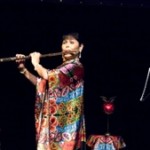 carismáticas en el mundo.
carismáticas en el mundo.
Elena Durán ha ofrecido conciertos y ha grabado discos con muchas de las orquestas más prestigiosas del Reino Unido, Europa y Estados Unidos, así como con prácticamente todas las orquestas importantes de México. Entre sus éxitos, cabe destacar la interpretación de su repertorio junto a la Real Orquesta Filarmónica en sendas galas celebradas en el Royal Albert Hall de Londres ante la reina Isabel II de Inglaterra.
Su actual proyecto, Amorcito Corazón, que presentará en el Instituto Cervantes de Dublín, está dedicado a las creaciones y las películas que musicalizó el gran compositor mexicano Manuel Esperón.
Elena fue recientemente nombrada “Embajadora de la Ciudad de México” en reconocimiento a su excepcional carrera y su trabajo comunitario.
We hope to see you today at 7pm at Cafe Literario where we offer you a concert of Elena Durán, one of the most charismatic flute players in the world today.
She has made concerto appearances and recordings with many major orchestras in the UK, Europe, the United States and with virtually every orchestra in Mexico. Elena has played regularly for members of the British Royal Family, including two Royal Galas with the Royal Philharmonic Orchestra in London’s Royal Albert Hall in front of Her Majesty the Queen.
Her current project, Amorcito Corazón, which she will be presenting at the Cervantes Institute in Dublin, is devoted to the music and the movies of the great Mexican composer Manuel Esperón.
Elena was recently named as “Mexico City’s Ambassador” in recognition of her exceptional career and her out-reach work.
This event has been organized with the cooperation of the Embassy of Mexico in Ireland.
Proyección de cine | Film screening: Chico & Rita
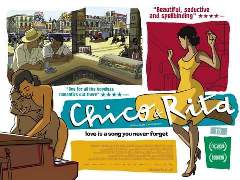 Si no tuviste oportunidad de asistir al encuentro con Fernando Trueba y Javier Mariscal ayer domingo, te aconsejamos que no pierdas hoy esta última oportunidad de participar en la charla de esta tarde con estos dos magníficos creadores. Si pudiste venir ayer, seguro que repetirás. Fue asombroso, delirante, divertido, interesante. En una palabra: genial.
Si no tuviste oportunidad de asistir al encuentro con Fernando Trueba y Javier Mariscal ayer domingo, te aconsejamos que no pierdas hoy esta última oportunidad de participar en la charla de esta tarde con estos dos magníficos creadores. Si pudiste venir ayer, seguro que repetirás. Fue asombroso, delirante, divertido, interesante. En una palabra: genial.
La proyección de Chico & Rita nos sirve como epílogo de este Festival ISLA de Literatura que tan buen sabor de boca nos ha dejado a todos. Los directores de la película, que fue seleccionada por la Academia del Cine de Estados Unidos para el Oscar a la mejor película de animación en 2012 llevarán a cabo la presentación y responderán a las preguntas del público.
En la Cuba de finales de los años cuarenta, Chico y Rita inician una apasionada historia de amor. Chico es un joven pianista enamorado del jazz y Rita sueña con ser una gran cantante. Desde la noche que el destino los junta en un baile en un club de La Habana, la vida va uniéndoles y separándoles, como a los personajes de un bolero.
Premio a la mejor película de animación en la XXV edición de los Premios Goya y en la XXIV de los Premios del Cine Europeo.
Fernando Trueba (Madrid, 1955) es guionista, editor y director de cine. En 1992, su película Belle Époque, obtiene 9 premios Goya y, en 1993, obtiene el Oscar a la mejor película de habla no inglesa.
Javier Mariscal (Valencia, 1950) es un reconocido diseñador multidisciplinar que comenzó los estudios de diseño en la escuela Elisava. Uno de sus últimos trabajos es la novela gráfica Chico & Rita que posteriormente se llevó a la gran pantalla como una película de animación junto a Fernando Trueba. Chico & Rita se ha traducido al inglés en 2011 por la editorial SelfMadeHere, publicándose también en Francia y Países Bajos.
Javier Mariscal and Fernado Trueba, directors of Chico & Rita nominated for Best Animated Academy Award, will introduce the film. Screening will be followed by Q&A with directors.
Chico is a young piano player with big dreams. Rita is a beautiful singer with an extraordinary voice. Music and romantic desire unites them, but their journey – in the tradition of the Latin ballad, the bolero – brings heartache and torment.
Fernando Trueba (Madrid, 1955) is a scripwriter, editor and cinema director. Between 1974 and 1979 worked as a film critic for Spain’s leading daily newspaper EL PAIS. In 1992, his film “Belle Époque” earned 9 Goya Awards and, in 1993, it won the Oscar for Best Foreign Language film.
Javier Mariscal (Valencia, 1950) is, first and foremost, an image creator who develops his work using all kinds of supports and disciplines. In 2010, he premiered the full-length cartoon film Chico & Ritawhich he jointly directed with Fernando Trueba and produced the comic Chico & Rita. In 2011 he published the illustrated book Los Garriris. Chico & Rita has been translated into English in 2011 and has also been published in France and The Netherlands.
Mesa redonda: Conflictos: ficción, humor y sociedad | Round table discussion: Conflicts: fiction, humour and society
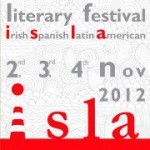 Como todos sabéis, hoy estrenamos festival, el Festival ISLA de Literatura, a las cuatro de la tarde, que será inaugurado oficialmente, a las 6:30, por el presidente de Irlanda, Sr. Michael D. Higgins.
Como todos sabéis, hoy estrenamos festival, el Festival ISLA de Literatura, a las cuatro de la tarde, que será inaugurado oficialmente, a las 6:30, por el presidente de Irlanda, Sr. Michael D. Higgins.
Mañana sábado, día 3 de noviembre, comenzaremos a las 11:30 con la mesa redonda que lleva por título «Escritores sin escrúpulos: intimidad, violencia y humor en la literatura», y continuaremos con «Cruzando fronteras: Poesía en la maleta». A las 3:30 compartiremos lecturas con varios de nuestros autores y a las 4:30 daremos paso a la mesa redonda «Conflictos: ficción, humor y sociedad», que contará con la participación de Lorenzo Silva, Bernardo Toro y Declan Bruke. Moderará la mesa Kate Quinn, de la Universidad Nacional de Irlanda en Galway.
Lorenzo Silva (Madrid, España, 1966), galardonado con el Premio Planeta hace apenas dos semanas, ha escrito, entre otras, las novelas La flaqueza del bolchevique (finalista del Premio Nadal 1997) que ha sido llevada al cine por Manuel Martín Cuenca, y Carta blanca (Premio Primavera 2004). Ha publicado también libros infantiles y juveniles, además de ensayos. Es especialmente conocido por la serie policíaca protagonizada por los investigadores Bevilacqua y Chamorro, iniciada con El lejano país de los estanques (Premio Ojo Crítico 1998), y a la que siguió, entre otras, El alquimista impaciente (Premio Nadal 2000), adaptada al cine por Patricia Ferreira. Su último libro publicado es Niños Feroces (2011). Su obra ha sido traducida a numerosos idiomas.
Bernardo Toro (Santiago, Chile) es un escritor radicado en Francia. En 1983 salió de Chile para continuar sus estudios en París, donde realizó un máster sobre la obra de Marcel Proust en la Universidad de La Sorbona. Entre 1988 y 1993, dirigió la revista de arte Lugares Extremos. Desde 1999 dirige la revista Rue Saint Ambroise, publicación dedicada al cuento contemporáneo. Actualmente es profesor y traductor literario. Es autor de dos novelas: Contretemps (A Contratiempo) (Les petits matins, 2006) y De fils à fils (De hijo a hijo) (Sotck, 2010). Su próxima novela, Qui d’autre à part nous, se publicará en el 2013.
Declan Burke ha publicado cuatro novelas hasta el día de hoy: Eightball Boogie (2003), The Big O (2007), Absolute Zero Cool (2011) y Slaughter’s Hound (2102). Absolute Zero Cool fue una de las finalistas en la categoría de novela negra para el premio Irish Book 2011 y recibió el premio Goldsboro Last Laugh a la mejor novela negra humorística en 2012. Es además el editor de These Green Streets: Irish Crime Writing in the 21st Century (2011) y co-editor, junto a John Connolly, de Books to Die For( 2012). Tiene una página web dedicada a la novela negra irlandesa llamada Crime Always Pays.
Cerraremos el día con la proyección del documental Neruda, el hombre y su obra.
We invite you to participate in a the round-table “Conflicts: fiction, humour and society” as part of the ISLA Festival. The event will be held the 3rd of November at 16:30 at Café Literario.
Historical memory, national or international conflicts and crime and daily life will be topics at this table thanks to literary works by guests Lorenzo Silva, Bernardo Toro and Declan Burke. Chaired by Kate Quinn (NUI Galway).
Lorenzo Silva (Madrid, Spain, 1966) is author of novels such as La Flaqueza del Bolchevique which was short listed for the Nadal Award in 1997, and was adapted for cinema by Manuel Martín Cuenca, andCarta Blanca which won the Primavera Award in 2004. He has also published books for children and young adults, as well as essays. He is especially known for the crime series starring detectives Bevilacqua and Chamorro, the series started with El lejano país de los estanques winner of the Ojo Crítico Award in 1998, and was followed by El Alquimista Impaciente winner of the Nadal Award in 2000, the later being adapted to cinema by Patricia Ferreira. His latest book Niños Feroces was published in 2011. His books have been translated into numerous languages such as Russian, French, German, Italian and Greek.
Bernardo Toro (Santiago, Chile) lives in France. He left Chile in 1983 to complete a masters degree at the Sorbonne University of Paris with a dissertation about Marcel Proust´s work. From 1988 to 1993 he was editor in chief of the art magazine Lugares Extremos. Since 1999, while working as lecturer and literary translator, he has been editor in chief of the magazine Rue Saint Ambroise, a publication dedicated to contemporary short stories. He is the author of two novels: Contretemps (2006) and De fils à fils (2010). His next novel, Qui d’autre à part nousis due for release in 2013.
Declan Burke has published four novels to date:Eightball Boogie (2003), The Big O (2007), Absolute Zero Cool (2011) and Slaughter’s Hound (2102).Absolute Zero Cool was shortlisted in the crime fiction section for the Irish Book Awards 2011, and received the Goldsboro Last Laugh Award for Best Humorous Crime Novel in 2012. He also is the editor of Down These Green Streets: Irish Crime Writing in the 21st Century (2011), and the co-editor, with John Connolly, of Books to Die For (2012). He hosts a website dedicated to Irish crime fiction called Crime Always Pays.
Hoy leemos con | Today we are reading with: Elia Barceló, Kevin Barry, Christopher Domínguez Michael, Keith Ridgway and María Negroni
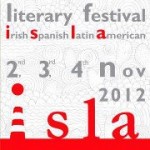 Ya solo quedan tres días para que de comienzo el esperado Festival ISLA de Literatura. Dentro de su programación, el sábado 3 de noviembre podremos disfrutar de un recital poético que dará comienzo a las tres y media de la tarde en nuestro Café Literario.
Ya solo quedan tres días para que de comienzo el esperado Festival ISLA de Literatura. Dentro de su programación, el sábado 3 de noviembre podremos disfrutar de un recital poético que dará comienzo a las tres y media de la tarde en nuestro Café Literario.
Elia Barceló, Kevin Barry, Christopher Domínguez Michael, Keith Ridway y María Negroni compartirán sus mejores textos con los asistentes al acto y unirán sus voces a este festival. La presentación, en este caso, correrá a cargo de Lorraine Kelly, de la Universidad de Galway (National University of Ireland). Pero, ¿quiénes son estos autores?, ¿no los conoces todavía?.
Elia Barceló (Alicante, España, 1957) ha publicado novelas policíacas, históricas, de ciencia ficción y género fantástico para adultos, así como novelas para jóvenes y ensayos. Ha sido traducida a diecisiete idiomas, entre ellos el inglés. Sus novelas traducidas al inglés hasta la fecha son: Corazón de tango (2007) (Heart of Tango, 2010) y El secreto del orfebre (2003) (The Goldsmith’s Secret, 2011).
Kevin Barry (Limerick). Su primer libro de relatos,There are Little Kingdoms, ganó el Premio Rooney de Literatura Irlandesa en 2007. Ha escrito sobre viajes y literatura para The Guardian, The Irish Times, The Sydney Morning Herald y muchas otras publicaciones. Su primera novela, City of Bohane (2011) ha sido galardonada en Reino Unido con el Authors’ club Best First Novel Award, que premia a la mejor primera novela del año.
Christopher Domínguez Michael (Ciudad de México, México, 1962), historiador y ensayista, es uno de los más conocidos críticos literarios hispanoamericanos. Es autor de numerosas publicaciones, siendo su última publicación Profetas del pasado. Quince voces sobre la historiografía de México (2011). Su Diccionario crítico de la literatura mexicana, 1955–2005 ha sido traducido y actualizado al inglés en 2012.
Keith Ridgway (Dublín, Irlanda, 1965). Su primera obra de ficción fue Horses (1997), a la que siguieronThe Long Falling (1998), Standard Time (2000); un libro de relatos, The Parts (2003); Animals (2006) yGoo Book (2011). Su última novela publicada esHawthorn & Child (2012). Ha recibido numerosos premios, entre ellos el Prix Femina Etranger y el Prix Premier Roman en París en 2001 por The Long Fallingbajo el título en francés Mauvais Pente, y el premio Rooney de literatura irlandesa en 2001. Las obras de Ridgway han sido traducidas a varios idiomas entre otros, el español.
María Negroni (Rosario, Argentina, 1951) es poeta, ensayista y novelista. Como poeta, ha publicado, entre otros libros: El viaje de la noche, Arte y Fuga,La Boca del Infierno y Cantar la nada. También ha publicado varios libros de ensayos y dos novelas. Su libro Islandia recibió el premio del PEN American Center en Nueva York al mejor libro de poesía en traducción del año (2001) y Galería Fantástica recibió el Premio Internacional de Ensayo de Siglo XXI (México). Su obra ha sido traducida al inglés, francés, sueco e italiano.
This event of ISLA Literary Festival will be an outstanding poetry reading in November 3rd at 3:30 at Café Literario.
Authors will read a selection of some of their best work in their original language in this poetry reading. Introduced by: Lorraine Kelly (NUI Galway).
Elia Barceló (Alicante, Spain, 1957) has published crime, historical, science fiction and fantastic novels for adults, as well as young adult books and essays. Her work has been translated into several languages, Spanish between others. Her novels translated into English are: Corazón de tango (2007), translated into English under the name Heart of Tango (2010) andThe Goldsmith’s Secret (2011), a translation of El secreto del orfebre (2003).
Kevin Barry was born in Limerick and now lives in Sligo. His first collection of short stories, There Are Little Kingdoms, won the Rooney Prize for Irish Literature in 2007. He has written about travel and literature for The Guardian, The Irish Times, The Sydney Morning Herald and many other publications. His debut novel City of Bohane (2011) recently won the Authors’ Club Best First Novel award in Britain.
Christopher Domínguez Michael (Mexico City, Mexico, 1962) is a historian and essayist, and also one of the most famous Hispanic-American literary critics. He is the author of several works, being his latest novel Profetas Del Pasado. Quince Voces Sobre La Historiografía De México was published in 2011. Since 2010 he has also worked as associate researcher at the Colegio de México. His workDiccionario Crítico de la Literatura Mexicana, 1955-2005 (Critical Dictionary of Mexican Literature, 1955–2010) has been translated into English and was updated in 2012.
María Negroni (Rosario, Argentina, 1951) is a poet, essayist and novelist. She has published numerous poetry books: Islandia, El viaje de la noche, Arte y Fuga, La Boca del infierno and Cantar la nada, to mention just a few. She has also published various essays collections and two novels. Her book Islandiareceived the 2001 PEN American Center Award for best book of poetry in translation. She was awarded the 21st Century International Essay Prize (Mexico) for her book Galería Fantástica. Her work has been translated into English, French, Swedish and Italian.
Keith Ridgway (Dublin, 1965). His first fictional prose Horses was published in 1997, followed by The Long Falling (1998), Standard Time (2000). A collection of short fiction, The Parts (2003), Animals(2006), Goo Book (2011) and Hawthorn & Child(2012). He has received numerous awards such as the Prix Femina Etranger and the Prix Premier Roman in Paris in 2001 for The Long Falling, under its French title of Mauvaise Pente, and The Rooney Prize For Irish Literature in 2001. His work has been translated into several languages and has been published in Spain, between other countries.
Mesa redonda: Cruzando fronteras: Poesía en la maleta | Round table discussion: Crossing frontiers: Poetry in the suitcase
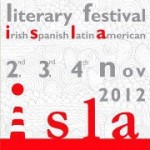 Le invitamos a una interesante discusión literaria que tendrá lugar el 3 de Noviembre a las 14:00, Festival Literario ISLA.
Le invitamos a una interesante discusión literaria que tendrá lugar el 3 de Noviembre a las 14:00, Festival Literario ISLA.
La poesía llega al festival ISLA con los autores Omar Pérez, Diego Valverde Villena, Máighréad Medbh y Lorna Shaughnessy. Cuatro formas de construir desde lo poético para enriquecer el panorama contemporáneo. Modera: Catherine O’Leary (NUI Maynooth)
Omar Pérez (La Habana, Cuba, 1964) es poeta, ensayista y traductor, además de periodista, crítico de teatro y cine, editor y locutor de radio. Su última publicación es la colección de ensayos El corazón mediterráneo (2011). Como poeta ha publicado Algo de lo sagrado (1996), ¿Oíste hablar del gato de pelea? (1999), Canciones y Letanías (2002) y Lingua Franca (2009). En inglés ha publicado Something of the Sacred (2007), traducción de Algo de lo sagrado, a cargo de Kristin Dykstra y Did you hear about the fighting cat? (2010).
Diego Valverde Villena (Lima, Perú, 1967). Poeta español y peruano, de ascendencia boliviana. En 2011 publicó su libro de poemas Un segundo de vacilación. Ha traducido obras de Conan Doyle, Kipling, John Donne, Ezra Pound, Valery Larbaud, Nuno Júdice, E.T.A. Hoffmann y Paul Celan, entre otros. Sus poemas aparecen en numerosas antologías y han sido traducidos a varios idiomas, entre ellos al irlandés. Entre sus principales obras de poesía se encuentran: El difícil ejercicio del olvido(1997), No olvides mi rostro (2001) y El espejo que lleva mi nombre escrito (2006).
Máighréad Medbh (Condado de Limerick, Irlanda) ha publicado cinco colecciones de poesía y un audiolibro. Fue pionera de la performance poética en Irlanda en los años 90. Su colección más reciente esTwelve Beds for the Dreamer (2010). Máighréad ha sido publicada en una gran variedad de antologías y ha escrito versiones de poemas gallegos para dos antologías recientes editadas por Manuela Palacios de la Universidad de Santiago de Compostela. Durante el festival, Máighréad presentará una mezcla de obras nuevas y algunas de Twelve Beds for the Dreamer y When the Air Inhales You.
Lorna Shaughnessy (Belfast, Irlanda del Norte, 1961) es poeta, traductora y profesora de Lengua Española en la Universidad Nacional de Irlanda, Galway. Ha publicado dos libros de poemas, Torching the Brown River (2009) y Witness Trees (2011) y dos traducciones de poesía contemporánea mexicana,Mother Tongue. Selected Poems by Pura López Colomé y If We Have Lost our Oldest Tales, de María Baranda (2006). Su traducción de The Disappearance of Snow de Manuel Rivas fue publicada en 2012.
You’re invited to an interesting literary discussion in November 3rd at 14:00, ISLA Literary Festival.
Poetry arrives at ISLA festival with authors Omar Pérez, Diego Valverde Villena, Máighréad Medbh and Lorna Shaughnessy. Four ways to build from poetry to enrich contemporary work. Chaired by Catherine O’Leary (NUI Maynooth).
(Havana, Cuba, 1964) is a poet, essayist and translator, as well as a journalist, theatre and film critic, editor and radio presenter. His last publication was the collection of essays El corazón mediterráneo (2011). As a poet he publishedAlgo de lo sagrado (1996), ¿Oíste hablar del gato de pelea? (1999), Canciones y Letanías (2002) andLingua Franca (2009). In English publishedSomething of the Sacred (2007), the translation ofAlgo de lo Sagrado by Kristin Dykstra, and Did You Hear About The Fighting Cat? (2010).
Diego Valverde Villena (Lima, Peru, 1967) is a Spanish and Peruvian poet of Bolivian descent. In 2011 he published his book of poems Un segundo de vacilación. He has translated, among others, works of Conan Doyle, Joseph Rudyard Kipling, John Donne, Ezra Pound, Valery Larbaud, Nuno Júdice, E.T.A. Hoffmann and Paul Celan. His poems appear in many compilations and have been translated into several languages, including Irish. His most famous works in poetry are El difícil ejercicio del olvido (1997), No olvides mi rostro (2001) and El espejo que lleva mi nombre escrito (2006).
Máighréad Medbh (Co. Limerick) has five published poetry collections and an audio CD. She was a pioneer of performance poetry in Ireland in the nineteen-nineties. Her most recent collection, Twelve Beds for the Dreamer was published in 2010. Máighréad has been published in a wide range of anthologies, and has written versions of Galician poems for two recent anthologies edited by Manuela Palacios of Universidade de Santiago de Compostela. During the festival, Máighréad will be presenting a mix of new work and some from Twelve Beds for the Dreamer and When the Air Inhales You.
Lorna Shaughnessy (Belfast, Northern Ireland, 1961) is a poet, translator and lecturer in Spanish in the National University of Ireland, Galway. She has published two collections of poems, Torching the Brown River (2009) and Witness Trees (2011) and two translations of contemporary Mexican poetry,Mother Tongue: Selected Poems by Pura López Colomé and If We Have Lost our Oldest Tales by María Baranda, (2006). Her translation of Manuel Rivas’ The Disappearance of Snow, was published in 2012.
Mesa Redonda: Escritores sin escrúpulos: Intimidad, violencia y humor en la literatura | Round table discussion: Writers without scruples: Intimacy, violence and humour in literature
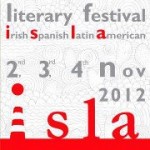 La primera actividad en el Festival Literario ISLA será una discusión literaria, que tendrá lugar el 3 de Noviembre a las 11:30 en el Café Literario.
La primera actividad en el Festival Literario ISLA será una discusión literaria, que tendrá lugar el 3 de Noviembre a las 11:30 en el Café Literario.
Temas como la identidad y la memoria, la violencia o el humor serán tratados por los invitados Ita Daly, Christopher Domínguez Michael, Rafael Gumucio y Catherine Dunne, con la moderación de Ciaran Cosgrove (Trinity College Dublin).
Ita Daly (Drumshanbo, Leitrim, Irlanda) ha publicado cinco novelas, una colección de cuentos y dos libros infantiles. Ha recibido el premio Hennessy Literary Award y el Irish Times Short Story Award. Su obra ha sido traducida al sueco, danés, japonés, italiano y alemán y sus relatos cortos han aparecido en revistas de Irlanda, Inglaterra y Estados Unidos. Uno de sus libros de relatos, The Lady With the Red Shoes, forma parte del plan de estudios de las escuelas de secundaria alemanas.
Christopher Domínguez Michael (Ciudad de México, México, 1962), historiador y ensayista, es uno de los más conocidos críticos literarios hispanoamericanos. Es autor de numerosas publicaciones, siendo su última publicación Profetas del pasado. Quince voces sobre la historiografía de México (2011). Es miembro del Sistema Nacional de Creadores de Arte desde 1993. Su Diccionario crítico de la literatura mexicana, 1955–2005 ha sido traducido y actualizado al inglés en 2012.
Rafael Gumucio (Santiago, Chile, 1970) ha trabajado como periodista en numerosos diarios nacionales chilenos, españoles y en el New York Times. En 1995 publicó el libro de relatos Invierno en la Torre y Memorias Prematuras. Ha publicado también las novelas Comedia Nupcial, Los Platos Rotos y Páginas Coloniales. Su última novela es La Deuda (2009). Actualmente es Director del Instituto de Estudios Humorísticos de la Universidad Diego Portales y co-conductor de Desde Zero en Radio Zero.
Catherine Dunne (Dublín, 1954), estudió inglés y español en Trinity College de Dublín. Su primera novela, In the Beginning, fue publicada en 1997. Le siguió A Name for Himself, finalista del premio Kerry Fiction Prize. Ha publicado otras seis novelas, The Walled Garden (2000), Another Kind of Life (2003), Something Like Love (2006), At a Time Like This(2007), Set in Stone (2009), Missing Julia (2011) y el ensayo An Unconsidered People: The Irish in Sixties London (2003). Sus novelas The Walled Garden (El jardín vallado) y A Name for Himself (Un nombre propio) han sido traducidas al español.
The first event in 3rd November of ISLA Literary Festival is a literary discussion, and it will take place at Café Literario at 11:30.
Topics such as identity and memory, violence or humour will be dealt with by guests Ita Daly, Christopher Domínguez Michael, Rafael Gumucio and Catherine Dunne, chaired by Ciaran Cosgrove (Trinity College Dublin).
Ita Daly (Drumshambo, Co. Leitrim) has published five novels, one collection of short stories and two books for children. She has won two Hennessy Literary Awards and an Irish Times Short Story Award. Her last novel, Unholy Ghosts (1997), was long listed for the International IMPAC Dublin Literary Award. Her work has been translated into Swedish, Danish, Japanese, Italian and German and her short stories have appeared in magazines in Ireland, England and America. Her short story collection The Lady With the Red Shoes (1980) is currently on the secondary school curriculum in Germany.
Christopher Domínguez Michael (Mexico City, Mexico, 1962) is a historian and essayist, and also one of the most famous Hispanic-American literary critics. He is the author of several works, being his latest novel Profetas Del Pasado. Quince Voces Sobre La Historiografía De México was published in 2011. He is a member of the Sistema Nacional de Creadores de Arte (National System for Art Creators) since 1993. His work Diccionario Crítico de la Literatura Mexicana, 1955-2005 (Critical Dictionary of Mexican Literature, 1955–2010) has been translated into English and was updated in 2012.
Rafael Gumucio (Santiago, Chile, 1970) has worked as a journalist for many Chilean and Spanish newspapers, as well as the New York Times. In 1995 he published the collection of short stories Invierno en la Torre and Memorias prematuras. He also published the novels Comedia Nupcial, Los Platos Rotos and Páginas Coloniales. His latest novel, La Deuda, was published in 2009. He now works as the director of the Institute for Humour Studies of the University Diego Portales and is co-conductor of Desde Zero at the radio station Zero. He received the Anna Seghers Award in Germany in 2002.
Catherine Dunne (Dublin, 1954). She studied English and Spanish at Trinity College, Dublin. Her first novel, In the Beginning, was published in 1997. A Name for Himself followed a year later, and was short listed for the Kerry Fiction Prize. She has published six further novels, The Walled Garden (2000),Another Kind of Life (2003), Something Like Love(2006), At a Time Like This (2007), Set in Stone(2009), Missing Julia (2011) and the non-fiction bookAn Unconsidered People: The Irish in Sixties London(2003). Her novels The Walled Garden (El jardín vallado) and A Name for Himself (Un nombre propio) have been translated into Spanish.
Festival Literario ISLA / ISLA Literary Festival
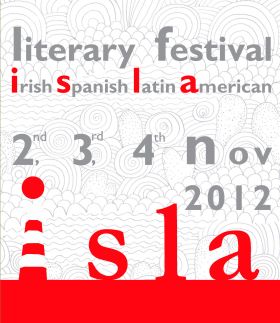 Irlanda es una isla grande y fértil. Una isla sembrada de escritores y de buena literatura. Un escritor, en algún momento de su labor creativa, también ha de convertirse en una isla, retirarse en silencio hasta el lugar en donde se encuentran las palabras, esas mismas palabras que luego descubrirá algún lector solitario, como un tesoro en una isla pirata, un tesoro en forma de libro.
Irlanda es una isla grande y fértil. Una isla sembrada de escritores y de buena literatura. Un escritor, en algún momento de su labor creativa, también ha de convertirse en una isla, retirarse en silencio hasta el lugar en donde se encuentran las palabras, esas mismas palabras que luego descubrirá algún lector solitario, como un tesoro en una isla pirata, un tesoro en forma de libro.
Un buen libro es una isla que contiene el universo.
ISLA es también el nombre que hemos querido dar a nuestro festival de literatura. Es el acrónimo de “Irish, Spanish and Latin American” Literary Festival. Es por tanto, también, una ISLA grande, fértil y multicultural en la que estamos todos unidos, irlandeses, latinoamericanos y españoles, por primera vez, en torno a la literatura.
Nunca antes se había celebrado un festival de estas características. Sin embargo, creemos que hacía ya mucho tiempo que venía siendo necesario. Hoy, gracias al entusiasmo demostrado tanto por Dublin UNESCO City of Literature, Ireland Literature Exchange, Poetry Ireland y el apoyo de las universidades Dublin City University, NUI Galway, NUI Maynooth y Trinity College Dublin, como por las embajadas de Argentina, Chile, Cuba, México y por supuesto por la Embajada de España, de la que el Instituto Cervantes forma parte, este festival es una realidad. Solo podemos tener palabras de agradecimiento para todos ellos.
Y aquí estamos todos, unidos en este proyecto. Comprometidos, comunicados, reunidos en este hermoso territorio común en el que hemos depositado tantas ilusiones.
No tiene sentido que algunas de las literaturas más fecundas del planeta sigan viviendo de espaldas entre sí. Es necesario que del intercambio de experiencias e ideas, de un mejor conocimiento entre unos y otros surjan nuevas traducciones, nuevos libros y, sobre todo, nuevos lectores.
Bienvenidos a nuestra ISLA.
Ireland is a great and fertile Island. It is an Island cultivated with writers and high quality literature. A writer during the course of his creative work must also become an island, withdrawing in silence to a place where words are kept. Those same words which some solitary reader will discover like hidden treasure on a pirate island, treasure in the form of a book.
A good book is a universe within an island.
The Spanish for ‘island’ is ‘ISLA’. It is the name we have chosen for our Literary Festival. It is the acronym for ‘Irish, Spanish and Latin American’ Literary Festival. It is also in that way a great, fertile and multicultural island where the Irish, Latin Americans and Spanish for the first time are all united and gathered around literature.
Never before has such a festival taken place. However, we believe it to be a much needed, unique event that has been a long time coming. Today, and thanks to the enthusiasm of Dublin UNESCO City of Literature, Ireland Literature Exchange, Poetry Ireland and the support of Dublin City University, Trinity College Dublin, NUI Galway, NUI Maynooth, the Embassies of Argentina, Mexico, Chile and Cuba, and by the Spanish Embassy, of which Instituto Cervantes is a part, this Festival is now a reality. We can only offer words of sincere gratitude to all of them.
We are all here, united in this project. Committed, connected and gathered together in this beautiful shared place where we have invested so many dreams.
It does not make sense that some of the most fertile literary figures on the planet should live in disregard for one another. It is imperative that from the exchange of experiences and ideas and from a better understanding between one another, new translations, new literature and, above all, new readers should emerge.
We wish you a warm welcome to our ‘island’ ISLA.
Matemagia: Matemáticas y Magia / Maths and magic en el Instituto Cervantes de Dublín
Fernando Blasco, mathematician, PhD in mathematics, and professor at the Universidad Politécnica de Madrid, visited the Instituto Cervantes in Dublin on the occasion of the “Maths Week Ireland 2012” and he made us enjoy the magic of mathematics with his “Matemagia”.
In this video, interviewed by Megan Specia in English, he shows us some of his “tricks”.
Fernando Blasco, matemático, profesor de la Universidad Politécnica de Madrid, visitó el Instituto Cervantes de Dublín con motivo de la Semana de la “Maths Week Ireland 2012” y nos hizo disfrutar de la magia de las matemáticas con su Matemagia.
En este video, entrevistado por Megan Specia en inglés, nos muestra algunos de sus “trucos”.
Concierto de guitarra clásica / Classic guitar concert: Inspiración española de Alan Grundy / Spanish Inspirations by Alan Grundy
Con motivo del Día de la Hispanidad, el Instituto Cervantes de Dublín se complace en presentar de nuevo sobre su escenario del Café Literario al afamado guitarrista clásico irlandés Alan Grundy. Te esperamos hoy día 11 de octubre a las 20:00 h en el Café Literario.
escenario del Café Literario al afamado guitarrista clásico irlandés Alan Grundy. Te esperamos hoy día 11 de octubre a las 20:00 h en el Café Literario.
Inspiración Española – un recital de guitarra a cargo del guitarrista Alan Grundy, compuesto por piezas inspiradas en el baile, la canción, la poesía, la pintura, los nombres y lugares de España. Desde danzas cortesanas de los siglos XVI y XVII de los compositores Diego Pisador, Alonso Mudarra y Gaspar Sanz (tocadas por Alan con vihuela y guitarra barroca) a piezas del siglo XIX de Albéniz y Tárrega inspiradas en nombres y lugares de España. El repertorio incluye también dos piezas originales compuestas por Alan Grundy, Día de España y The Old Guitarrist / La Guitarra.
Entradas: 15 /10 € SRC: reservas.dublin@cervantes.es
On the occasion of the near-coming Spanish National Day, Instituto Cervantes Dublin is delighted to bring again on stage renowned Irish classical guitarist Alan Grundy. The concert is today at 8.00pm at our Café Literario.
‘Spanish Inspiration’ – A Guitar Recital by guitarist Alan Grundy featuring guitar works inspired by Spanish Dance, Song, Poetry, Painting, Names and Places. From Court Dances of the 16th and 17th Centuries by Diego Pisador, Alonso Mudarra and Gaspar Sanz (played by Alan on Vihuela and Baroque Guitar), to 19th Century pieces inspired by Spanish names and places by Albeniz and Tarréga. The Recital will also feature two original works by Alan Grundy – Dia de España and The Old Guitarist / La Guitarra.
Tickets: 15 /10 € RSVP: reservas.dublin@cervantes.es
Nuevo ciclo de cine argentino en el Cervantes de Dublín / Argentinian Film series at #ICervantes #Dublin
Mañana miércoles comienza el nuevo ciclo de cine argentino en el Instituto Cervantes de Dublín, ofrecido por la Embajada de Argentina en Irlanda.
El cine argentino ha sido históricamente una de las tres filmografías más desarrolladas dentro del cine latinoamericano, junto a las producciones mexicanas y brasileñas.
Así, el cine creado en Argentina durante el siglo XX se convirtió en uno de los principales embajadores del idioma español por el mundo. La bandera de Argentina, del año 1897, se podría considerar como la primera obra cinematográfica nacional y desde su estreno hasta nuestros días han llegado a las pantallas cerca de 2500 películas argentinas con gran éxito de crítica y público, siendo La historia oficial (1985) y El secreto de sus ojos (2009) ganadoras del Oscar a la Mejor Película Extranjera.
En este ciclo podrás ver películas muy recientes como El hombre de al lado (2010), El mural (2010) o Las acacias (2011).
El ciclo será inaugurado mañana, 10 de octubre a las 18h con una recepción por cortesía de la Embajada de Argentina en Irlanda.
Come and enjoy the four films screened in this series offered by the Embassy of Argentina and Instituto Cervantes Dublin.
You will be able to see how Argentine cinema has been historically one of the three most developed productions of Latin American cinema, followed by Mexican and Brazilian production.
This way, the variety of films produced in Argentina during the 20th century bacame one of the most important ambassadors of the Spanish language all over the world. La bandera de Argentina (1897) could be considered the first national cinematographic piece and since its premiere, nearly 2500 argentine films have reached theatre screens with great acclaim from both critics and audiences.
Worth mentioning are La historia oficial (1985) and El secreto de sus ojos (2009), both awarded an Oscar for Best Foreign Language Film.
You could enjoy of recent films such as The man of next door (El hombre de al lado, 2010), El mural (The mural, 2010) or Las acacias (2011).
The Embassy of Argentina offers a wine reception on the opening of the film series, in October 10th at 6 pm.
[Video] Entrevista a Sheila Ríos en el Instituto Cervantes de Dublín
Sheila Ríos, de madre irlandesa y padre mexicano, ofreció un concierto en nuestro instituto el pasado 2 de octubre. Unos minutos antes, nos concedió una entrevista en la que habló de su carrera musical, su relación con Maná, y otros temas.
Sheila Ríos cuenta con una trayectoria artística llena de experiencia y reconocimiento. Su historia siempre ha estado envuelta en música, marcada por la herencia artística y nostálgica de Irlanda junto al romanticismo de las canciones mexicanas.
La música la ha llevado a muchas partes del mundo, con diferentes agrupaciones y como solista, destacando su participación con la banda mexicana de rock más reconocida y famosa a nivel internacional, “Maná”, con quienes ha compartido más que una profesión… una vida.
Ahora se encuentra trabajando en un nuevo disco donde interpreta sus propias composiciones. El más reciente, “Trozos de Luna”, fue producido por Fher, el líder y catante de “Maná”, junto con Fernando Quintana, quien en esta ocasión la acompaña en esta visita a sus raíces, en la bella Irlanda.
Sheila Ríos (Guadalajara, Jalisco, Mexico). With an Irish mother and a Mexican father, Sheila Ríos has an artistic trajectory full of experience and recognition. Her story has always been connected with music, marked by the artistic and nostalgic heritage and the romanticism of Mexican songs.
Her music has taken her to many parts of the world, both as solo artist and with different groups, of which “Maná” especially stands out, the most recognized and famous Mexican rock band, with whom she has shared more than a profession…a life.
Now she is working with new material where she interprets her own compositions. The most recent one, “Trozos de Luna”, was produced by Fher, the leader and singer of “Maná”, along with Fernando Quintana, who in this occasion is accompanying her during the visit to her roots in beautiful Ireland.
